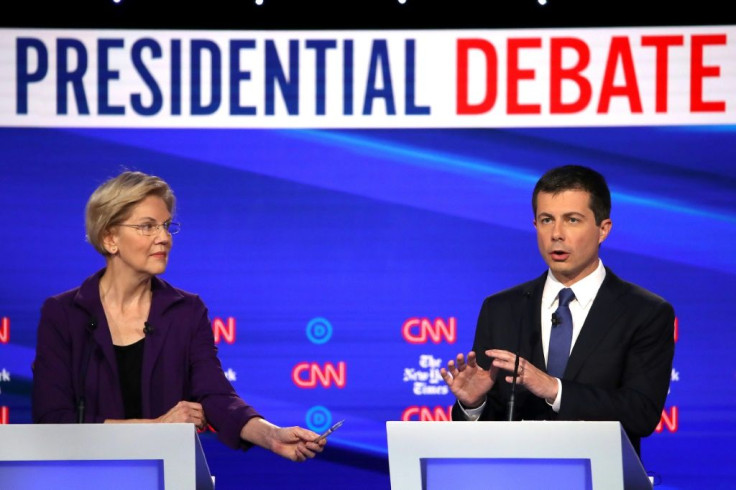Who's Leading Democratic Polls? Biden, Warren, Sanders, Buttigieg In Tight Race Ahead Of Iowa Caucus

A pair of national Democratic presidential primary polls indicate South Bend (Ind.) Mayor Pete Buttigieg is building momentum at the expense of Massachusetts Sen. Elizabeth Warren while former Vice President Joe Biden maintains his hold on the lead.
A Quinnipiac poll released Tuesday indicated Biden climbed 3 points compared with a month ago, with the support of 24% of likely Democratic primary voters nationwide. Buttigieg surged, now earning the support of 16% of voters -- a 10-point increase from last month. Warren, on the other hand, saw her support cut in half to 14% while Vermont Sen. Bernie Sanders slipped 2 points to 13%.
Meanwhile, A CNN/SRSS poll released Wednesday indicated similar trendlines for Buttiegieg and Warren. In that poll, Biden has the support of 28% of voters nationwide while Sanders comes in at second with 17%; Warren, third at 14%, and Buttigieg, fourth at 11% -- but the numbers reflect a surge for Buttigieg and a slide for Warren. In last month's poll, Buttigieg was at just 6% while Warren was at 19%.
The CNN poll suggests strong debate performance may be aiding Buttigieg's rise. When asked who performed the best in the most recent televised debate, the South Bend mayor came in first, with 22% saying he did "the best job" in the debate. Biden came in second at 16%, while Sanders was in third with 10%.
There is evidence Buttigieg and Warren are fighting over at least some of the same voters. Last month, FiveThirtyEight analyst Nathaniel Rakich took a look at the respective voter bases of the two candidates. He noted national polls "indicate that both Buttigieg’s and Warren’s bases are disproportionately college-educated" and that both candidates are much stronger with white voters than minority voters. However, Rakich also found a larger portion of Warren's voters identify as politically liberal while Buttigieg's base of support is more ideologically diverse.
"Buttigieg has broken into the top tier, apparently at the expense of Warren, who has taken a dive after being hammered for being too far left on healthcare and other issues," analyst Tim Mallory said in a statement.
Earlier this week, Buttigieg and Warren clashed over each other's transparency. Warren has declined to release tax returns beyond the past 11 years, which would include her time as a private legal consultant. "You've gotta be prepared to lead by example on transparency and that does mean disclosing your tax returns from both public and private sector work experience," Buttigieg told a reporter in response.
Warren responded by criticizing Buttigieg for failing to disclose his clients during his time as a private sector consultant at McKinsey, as well as failing to diclose the names of his campaign bundlers.
"I understand that there are some candidates who want to distract from the fact that they have not released the names of their clients and they have not released the names of their bundlers, who right now in this campaign are gathering up big checks and who are getting special access to the candidate," she said.
© Copyright IBTimes 2024. All rights reserved.




















